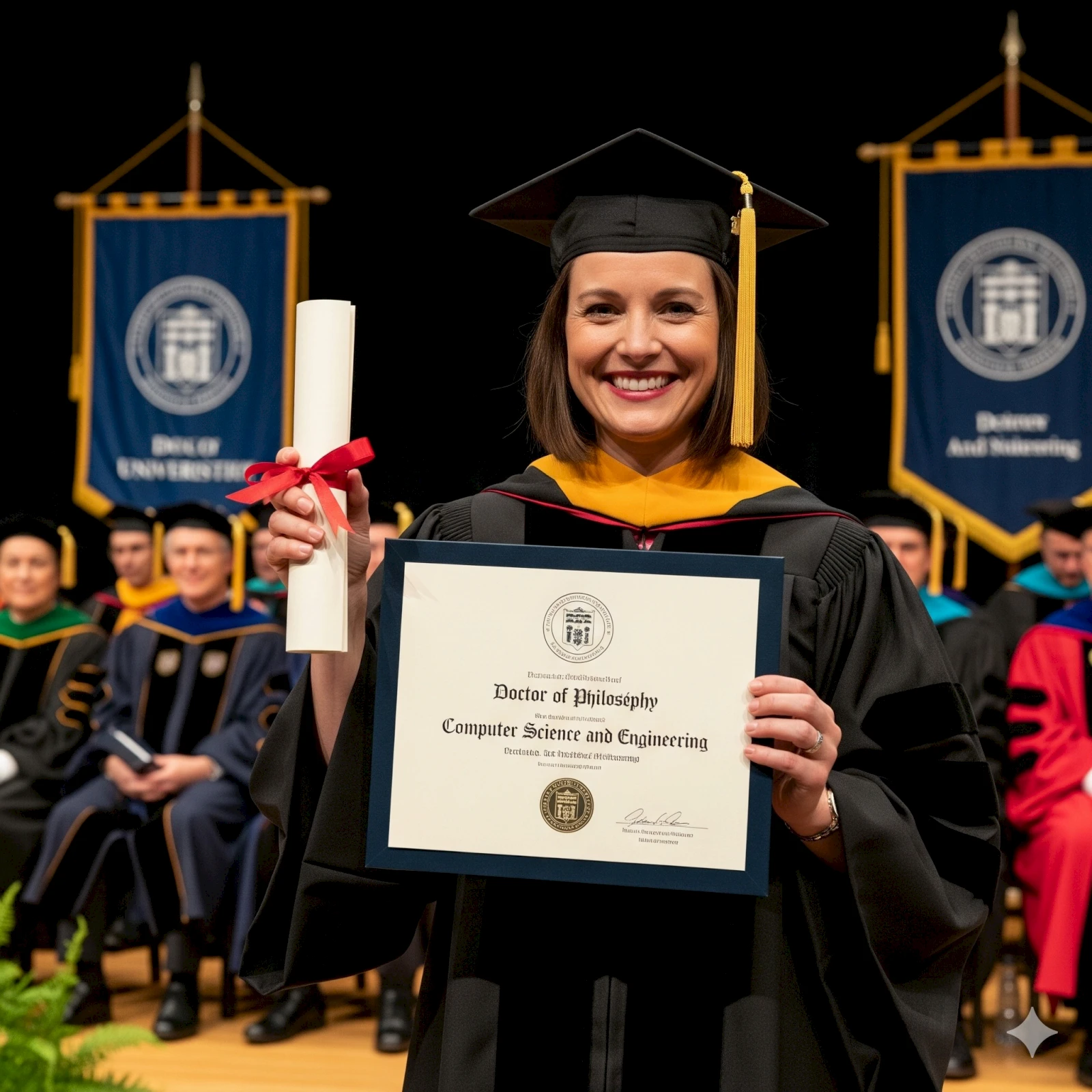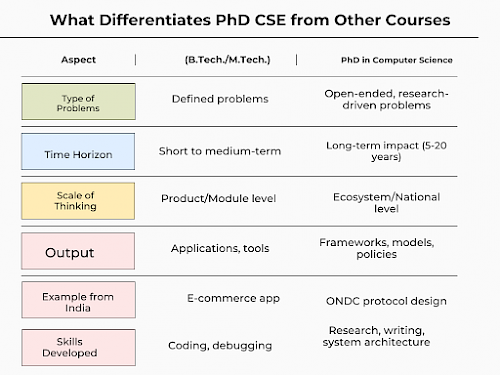It’s Not Just About the Research - How a Ph.D. in Computer Science Prepares You to Drive the Next Tech Revolution

Blog / August 29, 2025
Ph.D. in CSEPh.D. in Computer Science and EngineeringEvery significant technological change, whether it was the advent of the internet, the emergence of AI & ML, or the recent technological advancements in quantum computing, all began with an individual who not only programmed the tool but also thought deeply about how and why it exists.
That kind of thinking doesn’t grow in classrooms or through short-term projects. It comes from systems-level exploration, from learning how to ask better questions, and from building frameworks that others will follow.
That’s where the Ph.D. in Computer Science steps in.
But, why would someone spend five or more years studying a field most believe they already know well enough to work in? Why would one choose a Ph.D. in Computer Science when the industry offers well-paying jobs right after a bachelor’s or master’s?
The short answer: because a Ph.D. is not just about writing research papers. It’s about preparing to lead the next tech revolution.
The Ph.D. as a Discipline in Systems-Level Thinking
Code is everywhere, but code alone doesn’t run a country. What runs it are systems, distributed networks, scalable infrastructures, and secure protocols.
This is where the Ph.D. in Computer Science stands apart.
At the undergraduate or even master’s level, the focus is on solving problems. In a Ph.D., students design the environment in which problems will arise and define how they will be solved.
What Makes This Critical?
Learns to Build Frameworks, Not Just Features
Whether it’s ONDC (Open Network for Digital Commerce) or UPI, India’s breakthroughs aren’t apps. They are ecosystems.
Anticipates Failure at Scale
Systems break not because code fails, but because edge cases weren’t imagined. A Ph.D. teaches one to think at scale, ethically and technically.
A Ph.D. in Computer Science isn’t just about advanced algorithms. It’s about mastering the discipline of designing what others will build on. It’s the training ground for those who write the blueprint, not just the program.
Let’s take an example of UPI. It didn’t just require an interface. It needed:
- Secure protocol validation
- Multi-layered architecture for banks, users, and regulators
- Continuous risk monitoring
Each of these was informed by people trained not just in development, but in systems thinking.
Core Differences Between Coding Roles and Ph.D.-Level Systems Design

From Discoveries to Directions: Ph.D. in Computer Science Can Shape the Future
Publishing papers is important, but that’s not the full story. What matters more is who decides which questions deserve attention next.
That’s where a Ph.D. in Computer Science starts to show its real weight. This level of education prepares one to move beyond discovery and into direction-setting, deciding how society should use new knowledge.
- Shape debates: Not only create new algorithms, but also question their fairness, use, and long-term effect.
- Lead policy conversations: From data privacy to AI regulation, doctoral minds frame the real issues before others even see them coming.
Leading Through Uncertainty: From Research Challenges to Real-World Leadership
Most people want clear answers.
A Ph.D. in Computer Science prepares students for leadership roles that require not just having answers to known problems but also the mindset to solve unexpected and upcoming challenges for which we do not yet have solutions. It trains to ask sharper questions, even when clarity is far away. That’s a skill not taught in bootcamps or traditional courses. It comes from years of working through unsolved problems.
This is where real leadership forms. So, what does this leadership look like:
Comfort with uncertainty
- Learns to work on a problem for months, sometimes years.
Foresight in tough calls
- Develops the courage to say, “We don’t know this yet, but here’s how we can find out.”
Confidence in complexity
- Instead of rushing to finish, build systems that can stand long-term stress, debate, and growth.
Shiv Nadar University (Institution of Eminence): Shaping Tomorrow’s Tech Leaders with World-Class Ph.D. in Computer Science and Engineering
When the world is rapidly making new advancements in technology every day and unlocking the new potential in the field of AI, ML, cloud, etc, the demand for people who can think beyond code and lead with perfection is growing at a massive pace. The Ph.D. in Computer Science is a path that can make your way in this field.
At Shiv Nadar University, the Ph.D. in Computer Science and Engineering prepares students for lucrative careers in academia, research, the technology industry, and more. The School of Engineering provides a strong balance of academic excellence in the subject matter and state–of–the–art research facilities.
Areas of Specialization
- Artificial Intelligence
- Machine Learning Applications
- Data Science and Engineering
- Security and Privacy, and
- Systems and Networks
At Shiv Nadar University, you will get the right environment and exposure to pursue a world-class Ph.D. in Computer Science.
Synopsis
A Ph.D. in Computer Science is not just a research pursuit; it is a launchpad for building systems, shaping debates, and steering technologies that define economies and societies. It builds the mindset to solve problems that don’t yet have answers and prepares one to lead with depth in spaces where speed alone fails.
For those ready to move from execution to influence, from answers to direction, the Ph.D. in Computer Science at Shiv Nadar University is where your journey begins. Admissions are open, gear up and apply now.
FAQs
What is the total Ph.D. in Computer Science duration?
The overall Ph.D. in Computer Science duration typically ranges from three to six years; however, the timeline to complete your specific Ph.D. can vary widely depending on the institution and individual factors.
Explain the Ph.D. in Computer Science Eligibility Criteria.
The general Ph.D. in Computer Science Eligibility requires candidates to typically have a Master's degree in Computer Science or a related field with a minimum 55-60% or equivalent. Some institutions may also accept applicants with a four-year degree alongwith a minimum of 75% or equivalent marks.
Is a Ph.D. in Computer Science only for those who want to be professors?
Absolutely not, in fact, many Ph.D. holders get employed in premier R&D labs, deep-tech startups, think tanks, and even build new ventures.